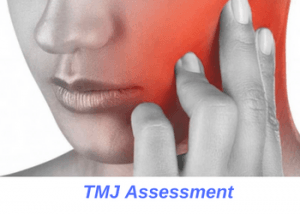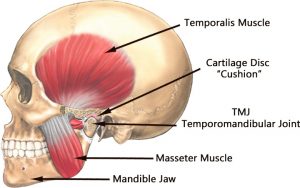What is temporomandibular joint (TMJ) disorder?
TMJ is short for temporomandibular joint. This is the only joint found in the skull region that is responsible for opening and closing your mouth. We have a left and a right TMJ joint. They work together to control your jaw movement. Trauma and wear and tear may damage the temporomandibular joints. TMJ disorders are sometimes responsible for migraine headaches, jaw stiffness, and other head and neck-related pain. People who grind their teeth aggressively and those with multiple missing teeth are particularly susceptible to developing TMJ disorders.

Teeth grinders and those with multiple missing teeth are particularly susceptible to developing TMJ problems
What is a TMJ assessment?
A TMJ assessment is an important part of any comprehensive dental examination. Early diagnosis of TMJ disorders allows for comprehensive and effective treatment. Here's what a typical TMJ exam entails:

TMJ problems may lead to migraine headaches and stiff head and neck
Evaluating your Head & Neck
Your dentist starts your TMJ assessment by asking a few general questions. The questions focus on whether you're experiencing frequent headaches or suffer from facial pain and discomfort. Afterward, your dentist will perform a head and neck exam to evaluate the TMJ status.
Joint Tenderness
Your dentist will examine the right and left TMJ joints. They will look for signs of stiffness, tenderness, and other signs of TMJ disorder.
Alterations in Jaw Movement
Your dentist will evaluate your TMJ by having you open, close, and move your jaws side-to-side and in and out. They will observe for pathway alterations, known as deviation or deflection, which may signal early TMJ disorder.
Abnormal TMJ Noises
Abnormal noises are another potential sign of TMJ disorders. TMJ noises, known as clicking, popping, or crepitus, could be early signs of disk derangement or arthritis.
How do you treat TMJ disorders?
If you're suffering from TMJ disorder then you should seek treatment. Without proper diagnosis and treatment, your condition could worsen and lead to serious complications. There are several different treatment modalities for treating TMJ abnormalities. This includes medications, physical therapy, and oral appliances to name a few. Here's a bit more information about treatment options for TMJ disorders:
Medications
NSAIDs (Motrin), muscle relaxants, and tricyclic antidepressants are helpful medications for treating minor TMJ pain. These medications reduce inflammation of the TMJ joints which reduces pain in the joints. For more advanced TMJ disorders, you may choose to have medications directly injected into the joint area to relieve tension and stress. BOTOX® is one of those medications that is used to relieve jaw tension and reduce TMJ pain. Applying heat/cold can also temporarily relieve the pain in your TMJ joints.
Physical Therapy
You can also see a physical therapist, not a dentist, to see if they can help. Physical therapists recommend joint exercises that could help. Combine physical therapy with a soft diet to see if it improves your TMJ symptoms. Counseling can also be helpful to identify and eliminate sources of destructive habits responsible for your jaw joints.
Nightguard
Most people suffering from TMJ disorders wear a custom nightguard. Wearing a nightguard protects your joints from the harmful effects of nighttime grinding. The nightguard relieves the pressure exerted onto the teeth and joints to protect against destructive grinding forces.
Specialist Referral
It might not be a bad idea to see a specialist for your TMJ pain. Many TMJ disorders stem from a poor bite relationship and correcting your bite relationship improves your condition. See your orthodontist to see if improving your bite relationship helps your TMJ condition. Similarly, having multiple missing teeth stresses the joints and causes TMJ problems. Having more teeth on one side of the mouth as compared to the other creates an imbalance that stresses the joints. Consider placing dental implants to enhance your bite and protect your joints. You may also want to remove your wisdom teeth if the pressure from the wisdom teeth is negatively impacting your joints.
Jaw Surgery
This is reserved for the absolute worse case TMJ pains. If your TMJ pain does not respond to other treatment modalities, then a more aggressive approach may be required. You can perform arthroscopic surgery to fix the TMJ joints. Naturally, you want to exhaust all your other resources before resorting to surgery.
How do I get started?
Contact your dentist if you suspect that you're suffering from TMJ disorders. Your dentist will evaluate your TMJ and look for signs and symptoms of joint pain or arthritis. Not all dentists treat TMJ. You may be referred for your treatment depending on whether or not your dentist treats TMJ disorders. Keep in mind that treating TMJ disorders is a long-term project. It requires patience, diligence, and trial and error to find the right treatment. Nevertheless, there is a remedy out there and you shouldn't have to suffer from jaw pain!

Search for a dentist who treats TMJ disorder and orofacial pain